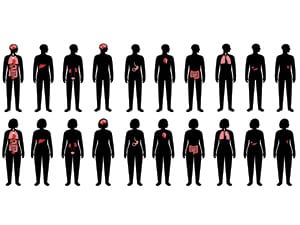Tissue-agnostic Approval of HER2-targeted Therapy
Fam-trastuzumab deruxtecan-nxki was approved for HER2-positive tumors, regardless of the tissue of origin.
The U.S. Food and Drug Administration (FDA) has granted accelerated approval to fam-trastuzumab deruxtecan-nxki (T-DXd, Enhertu) for adult patients with unresectable or metastatic HER2-positive solid tumors who have no alternative treatment options after prior systemic therapy.

T-DXd is an antibody-drug conjugate that facilitates the delivery of a cell-killing drug to cells that express HER2. HER2 is overexpressed in many breast and gastric cancers and, less frequently, in cancers arising in other tissues.
T-DXd was previously approved to treat certain breast, lung, and gastric cancers. The latest approval makes T-DXd available to eligible patients regardless of where their cancer originated.
This approval was based on results from 192 adult patients enrolled in one of three multicenter clinical trials: DESTINY-PanTumor02, DESTINY-Lung01, or DESTINY-CRC02. All patients had unresectable or metastatic HER2-positive solid tumors and had received previous treatment. Patients were treated with T-DXd until disease progression, death, withdrawal of consent, or unacceptable toxicity.
The percentage of patients who experienced an objective response to T-DXd treatment varied across trials, with response rates of:
- 51.4% in DESTINY-PanTumor02;
- 52.9% in DESTINY-Lung01; and
- 46.9% in DESTINY-CRC02.
The duration of response also varied across the three trials, with responses lasting for a median of:
- 19.4 months in DESTINY-PanTumor02;
- 6.9 months in DESTINY-Lung01; and
- 5.5 months in DESTINY-CRC02.
The recommended T-DXd dosage for this indication is 5.4 mg/kg delivered intravenously once every three weeks until disease progression or unacceptable toxicity occurs.
HER2 is a cell surface protein that regulates cellular proliferation. Overexpression of HER2, which occurs in approximately 2.7% of cancers, causes cells to grow rapidly.
The FDA rendered its decision on April 5, 2024. Accelerated approval means that continued approval may be contingent upon a confirmatory trial.